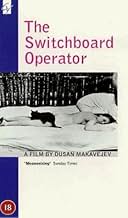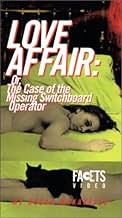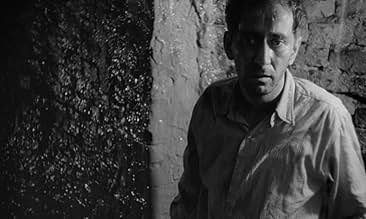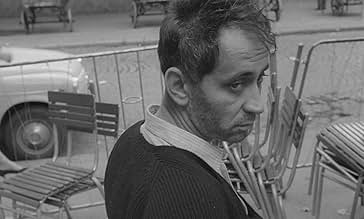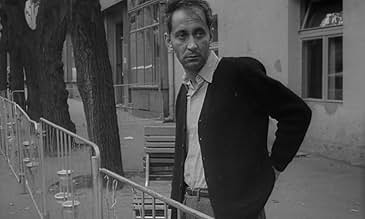Une affaire de coeur: La tragédie d'une employée des P.T.T.
Original title: Ljubavni slucaj ili tragedija sluzbenice P.T.T.
IMDb RATING
7.3/10
2K
YOUR RATING
A young female starts a love relationship with a serious young man. However, while he is away on business, she gets lonely and succumbs to her colleague's desires.A young female starts a love relationship with a serious young man. However, while he is away on business, she gets lonely and succumbs to her colleague's desires.A young female starts a love relationship with a serious young man. However, while he is away on business, she gets lonely and succumbs to her colleague's desires.
- Director
- Writers
- Stars
Aleksander Kostic
- Ekspert za seksualna pitanja
- (as Dr Aleksandar Dj Kostic)
Zivojin Aleksic
- Ekspert za kriminalistiku
- (as Dr Zivojin L Aleksic)
Dragan Obradovic
- Obducent
- (as Dr Dragan Obradovic)
- Director
- Writers
- All cast & crew
- Production, box office & more at IMDbPro
Featured reviews
Early on in his wildly experimental career, Dusan Makavejev was proving himself to be one of world cinema's most unique talents. With his brilliant, genre bending masterpiece "Love Affair", he crafts a simplistic, beautiful, and devastating portrait of one of film history's most tragic romances. Of course, Makavejev's vision is not limited by the boundaries of conventional storytelling and tone. Spliced in between the romantic tragicomedy are interviews with a sexologist and a criminologist, as well as various bits of stock footage depicting Yugoslavian politics.
This often weird and humorous version of a brutally sad tale is among my new favorite films thanks to its entertainment value, stunningly unique vision, wild sense of humor, and strong emotional impact. Makavejev pulls no punches, he allows the tragedy to burst in a chaotic explosion of tears, refusing to hold back. By the end, i was so struck with melancholy that I could hardly believe what I had just witnessed. This is a film that combines so many themes and genres, and yet manages to portray a semi-tradition story that anyone can follow. Sprinkling bits and pieces of the charmingly surreal and avant garde all over this saddening love story, Makavejev forms one of the finest, most unfortunately underrated and obscure cinematic romances of all time.
This often weird and humorous version of a brutally sad tale is among my new favorite films thanks to its entertainment value, stunningly unique vision, wild sense of humor, and strong emotional impact. Makavejev pulls no punches, he allows the tragedy to burst in a chaotic explosion of tears, refusing to hold back. By the end, i was so struck with melancholy that I could hardly believe what I had just witnessed. This is a film that combines so many themes and genres, and yet manages to portray a semi-tradition story that anyone can follow. Sprinkling bits and pieces of the charmingly surreal and avant garde all over this saddening love story, Makavejev forms one of the finest, most unfortunately underrated and obscure cinematic romances of all time.
That European cinema did things differently in the 1960s is not in doubt, as even directors from little-renowned cinematic cultures such as Yugoslavia delighted in new-found freedom. On one hand, "Switchboard Operator" is a simple tale of love, betrayal and tragedy in Belgrade, and as such captures some touching details about trapped lives in a totalitarian society. However, director Dusan Makavejev, clearly under the influence of Godard, adopts an offhand approach to his narrative, and introduces extraneous material at tangents to the main story. Most of this stuff is fascinating, particularly when he uses archive footage of Yugoslav history. Less successful are the interjections of two tedious academics, a sexologist and a criminologist, whose stern pronouncements jar against the film's capricious tone. Nonetheless, this is invigorating film-making which reaches into some strange regions. Despite an economical running time of 69 minutes, the film even finds time for a brief history of how the grey rat infested Europe!
To me, the story is lousy and boring, and dialogues, monologues and narrators are catastrophic. The only thing worth seeing in this movie is Eva Ras. She was really pretty girl in her youth, and this is the first Yugoslavian film with explicit nakedness. The scene in which the black cat is lying on Isabel's naked body is known not only within domestic but also the world cinematography.
3/10
3/10
Film for me is a matter of apprehension, of temporal experience of who you are relative to what is playing before you. So I don't care about a historicist or cinematic scholarly approach to films, in that film (and history) by itself is nothing, a carved artifact. This is my way of saying that there are probably several reasons to find this interesting, as token of 60s Yugoslav mores and 60s New Wave, admire the technique, which is wonderful in its freedom and placing. But for me, none of that matters when it doesn't enliven me.
A sexologist opens the film by humorously explaining the hidden omnipresence of sex in all we do, establishing the essence of the film as something to be secretly whispered and discovered.
The film follows a relationship between a rat exterminator and a blonde switchboard operator around Belgrade, the ups and downs. Salad days, captured with deliberate languidness. Eventually, there is betrayal and tragedy.
The point seems to be, contrasted levels of apprehension: everyday life in the affair in its dullness, small joy and unpredictability, with the system that frames that life as story, attempting to explain: 'experts' lecture on various topics, polemic footage of revolution play in ironic celebration, histories are recounted in voice-over. But you'll note, for instance, that the sexologist makes up nearly everything he says: Rembrandt did not paint sex, Mesopotamian priests did not sit ontop of a phallic column for days. The same fabrication then extends in the footage of joyous communist parades, a similarly subversive ploy is found in the silent Mr. West in the Land of the Bolsheviks.
But it's a weird, incongruent alignment of cycles that fails and fails to build for an hour. One hour felt like two. A big reason seems to be that this sort of bare observation was fresh at the time, but overly familiar now so all the vitality has been zapped out.
It just wastes what could have been a tremendously powerful last scene, where so much of what we see could be toyed with as different levels of involved understanding: a murder has been set up early in the film, but we don't know it's going to feature in the story, the different levels are that suddenly we are aware of what's coming (the murder), unexpectedly what we find out (that it was an accident), and what were the human emotional dynamics (regret and despair, not hate). Imagine the richness..
A sexologist opens the film by humorously explaining the hidden omnipresence of sex in all we do, establishing the essence of the film as something to be secretly whispered and discovered.
The film follows a relationship between a rat exterminator and a blonde switchboard operator around Belgrade, the ups and downs. Salad days, captured with deliberate languidness. Eventually, there is betrayal and tragedy.
The point seems to be, contrasted levels of apprehension: everyday life in the affair in its dullness, small joy and unpredictability, with the system that frames that life as story, attempting to explain: 'experts' lecture on various topics, polemic footage of revolution play in ironic celebration, histories are recounted in voice-over. But you'll note, for instance, that the sexologist makes up nearly everything he says: Rembrandt did not paint sex, Mesopotamian priests did not sit ontop of a phallic column for days. The same fabrication then extends in the footage of joyous communist parades, a similarly subversive ploy is found in the silent Mr. West in the Land of the Bolsheviks.
But it's a weird, incongruent alignment of cycles that fails and fails to build for an hour. One hour felt like two. A big reason seems to be that this sort of bare observation was fresh at the time, but overly familiar now so all the vitality has been zapped out.
It just wastes what could have been a tremendously powerful last scene, where so much of what we see could be toyed with as different levels of involved understanding: a murder has been set up early in the film, but we don't know it's going to feature in the story, the different levels are that suddenly we are aware of what's coming (the murder), unexpectedly what we find out (that it was an accident), and what were the human emotional dynamics (regret and despair, not hate). Imagine the richness..
To the newcomer, especially to a work like Love Affair or The Case of the Missing Switchboard Operator, it might appear that the filmmaker Dusan Makavejev has attention deficit disorder. The guy isn't interested in stories like your Pappy filmmaker John Ford was. He comes from a country that has been through the war and revolution, but he's well aware of what the moving image can give to the intended (or unintended) viewer. His style goes from one thing to another in a snap, without fair warning. This is why, perhaps, the best entry point into his career is the scandalous, hilarious politi-sex docu-drama-comedy WR The Mysteries of the Organism. Once you get through that, and you want more, you can go on to his earlier works such as this one.
In a way it's similar to WR in that it tells a very conventional, some would say uber-melodrama, story of a average-but-pretty switchboard operator who meets a rodent-catcher (aka sanitation worker) and they have a love affair. It has this, but Makavejev also cuts in clips from a sex doctor espousing about the nature of sex and phalluses in art, and how an egg is more than "just an omelet" and faces the audience directly with this. And, on top of this, we get every so often a fact about rodent over-populations and some political imagery and workers marching the in the street for good measure. For the filmmaker, this story of a girl and a man having a fling, mostly happy and only sad towards the end of their affair, when an unintentional betrayal occurs on the part of the girl, is just part of the woodwork, and we can take what we will what it means in context of rodents and sex... or a murder mystery for that matter.
Some of the film is amusing in its sudden movements and cutaways. Take the scene where Isabella is trying to work late and the guy that runs the switchboard keeps teasing her sexually, trying to have his way. She finally gives in, very reluctantly, and we see her face is devastated. Immediately this cuts to a very scratchy-grainy film stock showing "Adam and Eve", a naked man and woman, in a circling movement in various sculpture-like poses. What does this mean? Why does Makavejev throw this in here? Perhaps as a practical joke, or as one of those self-conscious beats akin to Godard. But for him, it could mean everything or nothing. We get some blatant nudity, but none of the sex is too graphic; it's about average people, then made non-linear by a (somewhat) average murder case, and then made extraordinary by its editing style and fresh outlook on Yugoslavian love and work.
In other words, expect a free-wheeling film that mixes real romance and satire, real documentary footage and breaking-the-fourth wall, melodrama and tragedy. It's not always exciting, and a little rough around the edges. For even the somewhat-fan of the director's, it's an anarchic treat.
In a way it's similar to WR in that it tells a very conventional, some would say uber-melodrama, story of a average-but-pretty switchboard operator who meets a rodent-catcher (aka sanitation worker) and they have a love affair. It has this, but Makavejev also cuts in clips from a sex doctor espousing about the nature of sex and phalluses in art, and how an egg is more than "just an omelet" and faces the audience directly with this. And, on top of this, we get every so often a fact about rodent over-populations and some political imagery and workers marching the in the street for good measure. For the filmmaker, this story of a girl and a man having a fling, mostly happy and only sad towards the end of their affair, when an unintentional betrayal occurs on the part of the girl, is just part of the woodwork, and we can take what we will what it means in context of rodents and sex... or a murder mystery for that matter.
Some of the film is amusing in its sudden movements and cutaways. Take the scene where Isabella is trying to work late and the guy that runs the switchboard keeps teasing her sexually, trying to have his way. She finally gives in, very reluctantly, and we see her face is devastated. Immediately this cuts to a very scratchy-grainy film stock showing "Adam and Eve", a naked man and woman, in a circling movement in various sculpture-like poses. What does this mean? Why does Makavejev throw this in here? Perhaps as a practical joke, or as one of those self-conscious beats akin to Godard. But for him, it could mean everything or nothing. We get some blatant nudity, but none of the sex is too graphic; it's about average people, then made non-linear by a (somewhat) average murder case, and then made extraordinary by its editing style and fresh outlook on Yugoslavian love and work.
In other words, expect a free-wheeling film that mixes real romance and satire, real documentary footage and breaking-the-fourth wall, melodrama and tragedy. It's not always exciting, and a little rough around the edges. For even the somewhat-fan of the director's, it's an anarchic treat.
Did you know
- TriviaThe film was initially refused a UK certificate by the BBFC owing to shots of pubic hair, though the distributor himself partly ruined its chances by ignoring the film's creative aspects and instead telling censor John Trevelyan "I am sending you a film with a few tits in it. I don't think much of it but I can sell it to the sex theaters". It was eventually passed with minor cuts in 1969 and released fully uncut on video in 1996.
- ConnectionsFeatured in Zabranjeni bez zabrane (2007)
Details
- Release date
- Country of origin
- Languages
- Also known as
- Love Affair, or The Case of the Missing Switchboard Operator
- Production company
- See more company credits at IMDbPro
- Runtime
- 1h 19m(79 min)
- Color
- Sound mix
- Aspect ratio
- 1.66 : 1
Contribute to this page
Suggest an edit or add missing content


